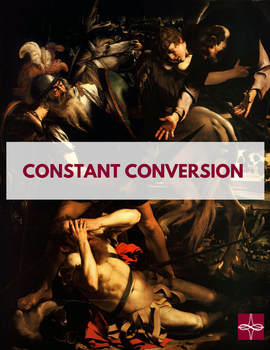 The story of St. Paul has always been one that has touched me to my very core. To think that someone who was persecuting the Church—who saw to it that the very first martyr, Stephen, was stoned to death—would eventually leave everything to follow God’s will for his life is truly extraordinary. But the story of St. Paul, although extraordinary, is not something beyond our reach. Some of us have experienced massive conversions in our lives—whether they involve entering the Church for the first time or returning to the sacraments after a time away. Some of us have had conversions of mind and heart when it comes to embracing what the Church teaches in regards to morality. Still others experience ongoing, undramatic conversion throughout their lives. Regardless of our individual experiences, the conversion of St. Paul can inspire us to encounter Christ in a deeper way that leaves us transformed. The Church does not celebrate the feast of the conversion of St. Paul merely for that moment of initial encounter and conversion. We celebrate it because of how it changed absolutely everything for Saul, now Paul. Paul met Christ personally; and this encounter guided his decisions and actions for the rest of his life. And so it must be with us! Shortly after Paul’s conversion on the road to Damascus, Acts 9:18 describes how after a conversation with Ananias, “things like scales fell from his eyes.” It was only after this that Paul was able to go and preach the good news of the Gospel—the good news that changed everything for him. Although we may not be knocked blind by a voice in the heavens, most of us do have scales on our eyes that prevent us from truly seeing and knowing Christ and spreading the Gospel. Whether we experience scales of sin, shame, bitterness, or inadequacy, we must remember that God desires constant conversion for us. Just as He so faithfully spoke to Paul in his conversion, He is inviting us to the same thing—the promise that a life turned toward Him will be better than anything our clouded eyes could imagine. This will manifest itself in our lives in any number of ways—through reconciliation in a relationship, returning to confession, or an increased disposition of mercy for those in our lives who need it. By allowing our lives to be constantly converted, we will be equipped, encouraged, and enabled to share the news that changed everything for Paul 2000 years ago and that continues to change everything for us now. Let us pray and ask the Lord for a deeper encounter with him. May he continually remove the scales from our eyes. St. Paul, pray for us! Questions for Reflection: Have you experienced a powerful moment of conversion or has your spiritual life been one of ongoing, gradual conversion? What might be some “scales” in your life that prevent you from living as a missionary disciple?
0 Comments
A little more than 100 miles south of Berlin, Germany, just north of the Ore Mountain Range, lies the small town of Lomnitz. In the early 20th century when millions of Europeans journeyed to the United States in search of a better life, a small group of immigrants from Lomnitz was processed through Ellis Island. To those immigrants, the United States federal government assigned the last name “Lomnitzer.” Just as those from New York are called New Yorkers, so too were those from Lomnitz to be called Lomnitzers. Although I am not German by blood, there is a special place in my heart for the small town of Lomnitz and the group of Lomnitzers that settled in America. When my paternal grandfather was born, he was left by his biological mother at the doorstep of a convent. The loving nuns found a home for the baby and he was adopted as an infant. He then became Charles Lomnitzer, a beloved member of the Lomnitzer family. It is through the generosity of the Lomnitzers that I, Tyler Lomnitzer, three generations removed, have a wonderful life and continue to bear the family name with honor and gratitude. The Lomnitzers recognized the dignity of each and every human person. Charles’s biological mother was unable to care for him, but the Lomnitzers nevertheless saw Charles as a gift and blessing to their family. Just as America provided a beacon of hope and the promise of a better life to the Lomnitzers, so too did the Lomnitzers provide a beacon of hope to my grandfather. I found the story of my family to be a powerful moment of prayer last Thursday, January 18 during the annual Vigil Mass for Life. The Mass takes place at the Basilica of the National Shrine of the Immaculate Conception in Washington, D.C. the night before the annual March for Life. Packed into the basilica were thousands of Catholics from all over the country who had gathered to pray for the legal protection of the unborn and for an increase in the recognition of the sanctity of life from conception until natural death. We gathered under the leadership of the bishops—Cardinal Dolan from the Archdiocese of New York was the celebrant and homilist—to come together as a Church in fellowship and prayer. It was the nuns’ prayer and commitment to life that found a home for my grandfather and paved the way for my life in this world; it will be the prayer and commitment to life of all those present at the basilica that will lead to (God-willing) thousands of beautiful lives to come. It was also the prayer and commitment to life of the Lomnitzers that allowed them to find room in their home for a little boy who needed parents. The Lomnitzer lineage is my lineage, not by blood, but by love. Please join me in prayer for all those who need parents, or lack other necessary means of survival. Question for Reflection: What are some ways that you can touch the life of someone you encounter so that the other might recognize their own life’s gift and sanctity? "Remember that the Christian life is one of action; not of speech and daydreams. Let there be few words and many deeds, and let them be done well." – St. Vincent Pallotti
Blessings to all on the feast day of St. Vincent Pallotti! Today’s feast is not celebrated universally in the Church, even though it is listed on the Vatican’s calendar of saints. And yet, this humble Roman priest who was ordained 200 years ago this coming May 16th, by his deeds and words still affects the lives of people around the world through his legacy, the Union of Catholic Apostolate. The Catholic Apostolate Center is a 21st century expression of the charism of St. Vincent Pallotti as articulated in the General Statutes of the Union, particularly number 12: “The Union of Catholic Apostolate participates in the mission of the Church to reawaken faith and an awareness of the vocation to the apostolate, to rekindle charity among all the members of the People of God, so that they be ever more united in a commitment to spread charity and so that there be, as soon as possible, one flock under one Shepherd (cf. Jn 10, 16). Therefore, the Union, in communion with the competent Pastors, promotes collaboration among all the faithful in openness to new forms of evangelization.” The action that we take is not simply on our own, but is in collaboration and union with others and fosters greater co-responsibility for the mission of Christ and his Church. As we celebrate this special feast day today, please know that our prayers are with you. May you continue to revive faith, rekindle charity, and form apostles wherever you are and in whatever you are doing. May your words and deeds be done well! May the Charity of Christ urge us on! "Remember that the Christian life is one of action; not of speech and daydreams. Let there be few words and many deeds, and let them be done well." – St. Vincent Pallotti Blessings to all as we prepare to celebrate the feast of St. Vincent Pallotti on January 22nd! Some may ask, “Who is that?” I am glad that you asked. St. Vincent Pallotti and his charism are the reason why the Catholic Apostolate Center exists. He was a priest of the Diocese of Rome in the first half of the nineteenth century. His ministry spanned the poor to popes. It did not matter what a person was, but who the person was, an image and likeness of God, the Infinite Love. He saw all people as gifted by God with talents that were meant to be shared. On January 9, 1835, St. Vincent Pallotti was inspired to found the Union of Catholic Apostolate, a collaborative association of lay people, religious, and clergy, who were called to assist in the missionary efforts of the Church through all apostolic methods and means, “revive, maintain, and increase the faith” of Catholics, and be an “institution of universal charity”. Over time, a community of priests and brothers and communities of sisters developed as well. Members of the Union of Catholic Apostolate are now in over 50 countries around the world. The Catholic Apostolate Center, a ministry of Pallotti’s community of priests and brothers, is a 21st century expression of his charism that works to revive faith, rekindle charity, and form apostles. Looking the other way when others were in need was not possible for Pallotti and his life calls all, particularly Catholics, to be more than simply passive participants in the Faith. Instead, we are called to be apostles, sent by Jesus Christ out into the world to spread the Gospel and charitably bring healing and consolation in the midst of brokenness and suffering. The most vulnerable and in need were closest to the heart of St. Vincent Pallotti as he and his companions went into the streets of Rome to care for them day after day and night after night. On January 22, 1850, he died from a respiratory illness because he had braved the elements to continue his work after giving away his cloak to a poor elderly woman on a cold, rainy night. St. Vincent Pallotti understood well what Pope Francis teaches us today: “Jesus, the evangelizer par excellence and the Gospel in person, identifies especially with the little ones (cf. Mt 25:40). This reminds us Christians that we are called to care for the vulnerable of the earth” (Evangelii Gaudium, n. 209) We invite you to learn more about St. Vincent by downloading our Pallotti App or visiting our Pallotti Portal. May the Charity of Christ urge us on!
Two weeks ago, I was walking from my cozy warm apartment in the Northeast part of Washington, D.C. to Union Station to meet up with a friend for dinner. It was 18*F (-7*C) outside and the wind was just starting to pick up. There were forecasts of snow in the next few days. I was bundled up with a wool sweater, socks, jacket, scarf, and gloves. About ten minutes into my walk, I started to regret my decision to walk and wondered if I should’ve called a cab. As I approached Union Station, I could see the Capitol building lit up in the distance. It was there that I saw 8 people lying on the streets completely covered with layers and layers of clothing and blankets. I immediately forgot my own brief and temporary plight. It was a stark and chilling reminder of the great poverty that still exists not only in other countries, but right here in the United States in our capital city. Each January, the Church in the United States recognizes Poverty Awareness Month and takes up Pope Francis' challenge “to live in solidarity with the poor.” Last year, Pope Francis called for the observance of the very first World Day of the Poor. This call was not just for faithful Catholics, but for people of all nationalities, creeds, and socioeconomic backgrounds. As he said in his message for the first World Day of the Poor, “Love has no alibi. Whenever we set out to love as Jesus loved, we have to take the Lord as our example; especially when it comes to loving the poor.” The church and world responded with countless acts of charity and kindness to the poor. Poverty is a massive issue with far too many heartbreaking statistics for us to consider it on only one day each year. It is a concern that needs constant attention and awareness that we can cultivate on a daily basis. Poverty does not simply come in the form of homelessness, but can manifest itself in many different ways. It can be manifested in our neighbor who has to choose between buying prescriptions or groceries, or in the child who cannot focus on school because they have not eaten the proper food they need. It can be manifested in the single mother who cannot afford childcare while she works. Each of us can work towards helping to alleviate poverty. Here at The Catholic University of America, we run a large number of different programs throughout the year that highlight various forms of poverty and ways to help. Twice a year we have massive service days during which we send nearly 900 students to help local organizations that serve the poor. Every week we have twenty opportunities for students to serve the poor across seven different service sites. Some of these include going to soup kitchens or after-school centers and volunteering with the Missionaries of Charity. One of the most highly attended opportunities is a recurring homeless food run in which students take food and supplies to areas of D.C. with large homeless populations. The students do not simply pass out food, but sit and talk with the homeless. They get to know poverty on the most human level possible. They offer their resources, time, and love to those in need. These types of efforts enable us not only to give the poor material goods and the gift of our time, but also help us personally grow. Walking in solidarity with our brothers and sisters and encountering them leaves us transformed. As Pope Francis wrote in Evangelii Gaudium, “This is why I want a Church which is poor and for the poor. They have much to teach us. Not only do they share in the sensus fidei, but in their difficulties they know the suffering Christ. We need to let ourselves be evangelized by them…” Throughout the year, I encourage you to consider participating in or making your own outreach to help those in need—and to bring a friend. Let us allow ourselves to be evangelized by the poor, live in solidarity with them, and work to alleviate their suffering. As St. Vincent Pallotti, the patron of the Catholic Apostolate Center, reminds us, “Remember that the Christian life is one of action; not of speech and daydreams. Let there be few words and many deeds, and let them be done well.” Questions for Reflection: What are some concrete ways you can help alleviate poverty? Has a personal encounter with the poverty of another ever impacted your spiritual life? In my prayer life recently, God has been speaking to me a lot about obedience. Obedience to Him, to my family, to my job, to my responsibilities. Perhaps it is because I’m not very good at some of my responsibilities, or maybe it is a call to become more in tune with and to pray for God’s will.
In today’s Gospel (Mark 1:40-45), Jesus heals a man who comes to him asking to be cleaned of his leprosy. Upon healing him completely, Jesus says, “See that you tell no one anything, but go, show yourself to the priest and offer for your cleansing what Moses prescribed; that will be proof for them” (Mark 1:44). Instead, the man “began to publicize the whole manner” where it made it “impossible for Jesus to enter a town openly” (Mark 1:45). How often are we disobedient like this man? How often has Jesus told us something that we missed completely? How often have we placed our desires and actions above what God wills for us? By his choice to disobey Jesus, instead of exalting God, the healed man exalts himself. The Catechism tells us that “sin sets itself against God's love for us and turns our hearts away from it” and that sin is “opposed to the obedience of Jesus.” When the healed man ignored Jesus’ directions, it furthered him from fully understanding God’s love and mercy for him. For us, too, when we sin and choose to follow our will over the Lord’s, we distance ourselves from God’s love. How can we know God’s will for us? It is not always so easily stated to us as it was to the man who was healed of his leprosy. To know God’s will, we must pray with open and patient hearts. Pope Francis recommends that we pray for the desire to follow God’s will, to know his will and to follow it. The saints are also great models of teaching us to pray and love God’s will for us. They are in complete union with Jesus in heaven because they learned to desire, love, and follow God’s will for them throughout their earthly lives. Look to any saint, and they will show you obedience. For example, St. Maximilian Kolbe was martyred, taking the place of a man who was to be killed in Auschwitz. Before that, his writings show that his prayer life was repeatedly focused on knowing the will of God. St. Maximilian Kolbe said, “Obedience is the one and the only way of wisdom and prudence for us to offer glory to God... Let us love our loving Father with all our hearts. Let our obedience increase that love, above all when it requires us to surrender our own will. Jesus Christ crucified is our sublime guide toward growth in God’s love.” St. Maximilian Kolbe’s words and sacrifice point us towards obedience, and teach us that obedience helps us to grow in God’s love. So perhaps my prayers that are revealing obedience as a theme are leading me to stretch my heart to know and share God’s love. Through obedience, I can know Christ’s peace and mercy—the same love he felt when the man with leprosy came to him; the same love he felt when he died on the cross. It is my prayer that as the desire for obedience touches my heart, you too may know the love and joy that comes from asking God to desire his will, know his will, and follow his will. Questions for Reflection: What are some ways you can grow in obedience to God’s will this year? Are there any saints who inspire you by their willingness to follow Christ? Alyce Shields is a teacher in Washington, D.C. Have you ever wanted to share a valuable treasure with others? Something irreplaceably precious, meaningful, enduring, or even priceless? Would you want to entrust it with a loved one and hope he or she values it as you do? You may be thinking of a prized heirloom, award, or work of art as examples, but my hope is that you also come to think of the Faith as something most worthy and deserving of being cherished and shared like our most beloved possessions.
The life of faith for the Christian starts with his or her baptism. Perhaps you’ve witnessed the beautiful act of the transmission of the Faith during an infant baptism at Mass. In the sacrament of baptism, we are reminded of the wonderful work of God, Who desires to sanctify humanity and make us His sons and daughters. After blessing the baptismal font of water, the priest will turn to the parents and godparents and urge them to renew the vows of their own baptism in preparation for the incredible responsibility and solemn duty that they will undertake. Of course, the depth of the sacrament does not stop there. The baptized will be spiritually guided and supported by parents, guardians, and sponsors throughout his or her spiritual life. As we read in the Catechism of the Catholic Church, “Holy Baptism is the basis of the whole Christian life, the gateway to life in the Spirit, and the door which gives access to the other sacraments. Through Baptism we are freed from sin and reborn as sons of God; we become members of Christ, are incorporated into the Church and made sharers in her mission.” Like all sacraments, there are symbols (sacramentals) which convey a deeper religious meaning. Water represents death and new life. The anointing with the chrism of salvation represents being welcomed as a member of God’s holy people. The white garment is an outward sign of Christian dignity. The lighted candle symbolizes keeping the flame of faith burning in our hearts. As each of us know, it can be difficult to remain steadfast in our faith—that is why it is critical to walk with others in our journey of faith. We live in a world that does not know the light of Christ and is often in need of hope. In a general audience last August, Pope Francis reflected on the significance of baptism as a sacrament of hope. He asked, “What does it mean to be Christians? It means looking to the light, continuing to make the profession of faith in the light, even when the world is enveloped in darkness and shadows.” The baptized are called to be people of hope who encounter and engage with the world in a way that proclaims the Good News of salvation. By surrounding ourselves with a strong community, we will be able to “make our profession of faith in the light” and better live out our baptismal vows. It may have been a while since you reflected on your baptism. Many of us were baptized as infants and so we have no memory of that wonderful moment aside from photos and our baptismal certificate. In our culture, we remember birthdays and anniversaries. What if we celebrated our baptism, the day of our “rebirth,” with similar joy? Our Faith is our most priceless possession. We did not create it, but nevertheless have been entrusted with it to guard, nourish, and share all the days of our life. Our Faith sustains us not only when we want to tap into it, but at every moment in our lives. If we have fallen short at times along our journey and fallen into sin, we have the sacrament of reconciliation to cleanse us of our failings. God never loses faith in us, especially when we may lose faith in Him or ourselves! As Pope Francis said, God “never tires of forgiving, but at times we get tired of asking for forgiveness.” Baptism is the powerful reclamation of each and every one of us by Almighty God as His children! This knowledge changes the way we live and imbues us with hope and joy. Our journey does not end once we have been baptized. The spiritual journey lasts a lifetime. Throughout it, we are never alone. God comes to our aid in times of difficulty or hardship. Our baptism ensures this while also orienting our lives toward Jesus Christ. Let us not fear the darkness or the night, but live in the light and hope of Christ. Pope Francis encourages us: Christians…do not live outside of the world, however; by the grace of Christ received in Baptism they are “oriented” men and women: they do not believe in darkness, but in the dim light of day; they do not succumb to the night, but hope in the dawn; they are not defeated by death, but yearn to rise again; they are not cowered by evil, because they always trust in the infinite possibilities of good. And this is our Christian hope: the light of Jesus, the salvation that Jesus brings to us with his light that saves us from the darkness. May we embrace the beauty of our faith this year and look to our baptism as a point of rebirth that illuminates our path and guides us forward on our journey towards Christ! Questions for Reflection: How has your baptism filled your life with hope? Who are some people that help guide you throughout your spiritual journey? My son is just learning to walk. At 15 months, he’s starting to take his first, unsteady steps. He wobbles from chunky leg to chunky leg, looking back at us to make sure everything is alright, and plops on the floor after a few strides. He loves it when we cheer him on, and then he gets back up and begins again. We, too, are beginning again. We have walked into a new calendar year. This Monday, we will celebrate the end of the Christmas season on the Solemnity of the Baptism of Our Lord and enter into Ordinary Time. How are we walking into the new year? As a parent, I know my son is taking his first steps towards walking securely. Little does he know that these steps will prepare him to one day run. I know his trajectory, but the path for him is still unknown. Similarly, God knows our path. He knows what He created us to be and do, what our gifts and talents are. He made us to run, and yet He does not interfere with our free will. We, like my son, are often walking into an unknown future. We take step after step in faith with God walking alongside us. How do we make our journey? Are we stumbling or walking confidently in God’s grace? Do we look to Him when things seem unbalanced and reach for His hand? Even when things seem steady, do we turn back, like my son looks to his parents, and look for God and His reassuring presence? Do we ask God for His help and guidance? God walks with us throughout each chapter of our lives. His coming into the world in the Incarnation, which we celebrated at Christmas, is a beautiful and mysterious proof of the lengths God is willing to go to be with us. He wanted to be intimately involved in the human story—and so He became one of us. He interacted with mankind as a man Himself, ultimately taking on the weight of our sin and opening the doors to salvation. God intervened in a radical and beautiful way by physically walking alongside us in the person of Jesus Christ, and He continues to do so through His church, the sacraments, prayer, and our communities. As we end the celebration of Christmas and enter into the new year and Ordinary Time, I invite you to reflect on how you are walking into this season of life. We have spent the weeks of Advent preparing for and celebrating the coming of Jesus Christ into our midst. But have we left Him in the manger? Have we forgotten to bring the Christ child home with us or kept room for Him in the inn of our hearts? Let us allow God to be intimately a part of our lives throughout this upcoming year. May we walk with Him and towards Him each day, whether we are stumbling or walking confidently, so that we, like my son, may come one day to run. Question for Reflection: How can you walk more closely with God and toward Him this year? This is such a rich time for us as Catholic Christians! Within the past month, we’ve begun a new liturgical year, celebrated in praise and thanksgiving the Nativity of our Lord, the Holy Family, and the Blessed Virgin Mary, and we continue to celebrate as we approach the Epiphany of our Lord. It is quite difficult to wrap our hearts and minds around the richness that has been available to us over these past four weeks in the midst of the hustle and bustle of the holiday season. Among the chaos of planning and celebrating, we have also rung in a new calendar year. 2017— with its successes, failures, struggles and triumphs—has come to a close and we stand at the precipice of 2018. We all know what that means: New Year’s resolutions. Are you hoping for more control over your health, finances, or career? Perhaps you are hoping to find more time to pray and manage stress in your life. What is it that you are hoping to gain control of this year or to do more regularly? As we prepare to choose and implement changes that we would like to make in our lives, let us not forget that we are still in the midst of celebrating the Word made flesh, Emmanuel. The change and possibility of a baby, born in a humble manger, is reflected in the beginning of a new year. Is our gaze still fixed on the babe in swaddling clothes? What would 2018 bring if instead of resolving to gain control of our lives, we truly allowed the Messiah to be Emmanuel, God with us. Jesus is waiting for each and every one of us to echo the “yes” that was uttered by the Holy Family as they welcomed Him into their lives. What if instead of resolving to control everything, we resolved to say yes to that tiny baby born of a Virgin? During one of the Advent homilies at our parish, our pastor challenged us to think about times we have attempted to be the messiah of our own lives by trying to grasp or control various situations or circumstances. During this time of change and resolution, it can be tempting for us to forget that we are not the Messiah as we make plans and goals for the upcoming year. As I reflect on this, I am reminded of the words of the hymn “These Alone Are Enough” by David Schutte, based on the Suscipe prayer of St. Ignatius of Loyola: “Take my heart oh Lord. Take my hopes and dreams. Take my mind with all its plans and schemes. Give me nothing more than your love and grace. These alone, oh God, are enough for me.” It is good and just to strive to improve our character and to foster good and healthy habits in our lives. However, instead of resolving to do it on our own, by the gift of that blessed Christmas morning, we have the choice to freely give all of these things over to the One who makes all things new. As you stand at the threshold of this New Year and envision your hopes and dreams for 2018, take a moment to reflect on what these possibilities could become if you allowed them to be infused by the abundant grace of God. It is still the Christmas season. There is still time to approach the manger. Take the leap of faith. Instead of resolving to gain control, approach the manger and resolve to say YES and to be transformed! Resolve to offer the babe in swaddling clothes your mind, your heart, your body, and soul. As you boldly step out into 2018, my prayer for you echoes the words of Saint Paul, “May the God of peace make you perfectly holy and may you entirely, spirit, soul, and body, be preserved blameless for the coming of our Lord Jesus Christ. The one who calls you is faithful, and he will also accomplish it.” Question for Reflection: What are some resolutions you can hand over to the Lord this New Year? |
Details
Archives
July 2024
Categories
All
|
About |
Media |
© COPYRIGHT 2024 | ALL RIGHTS RESERVED


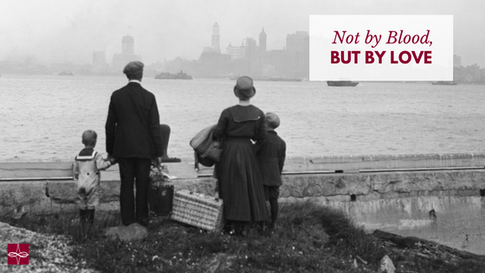

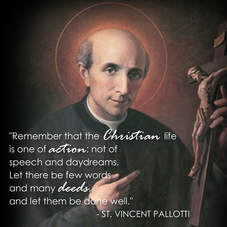
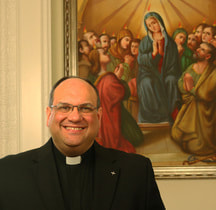
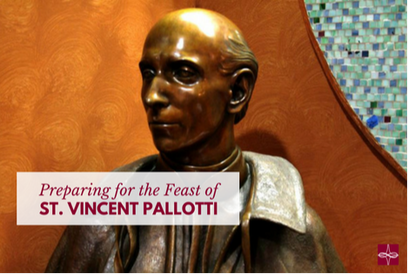
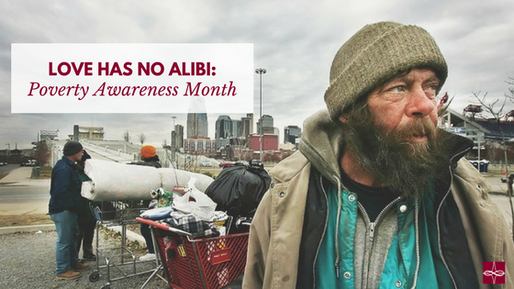


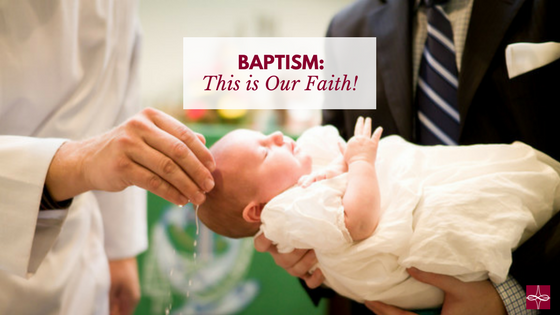





 RSS Feed
RSS Feed